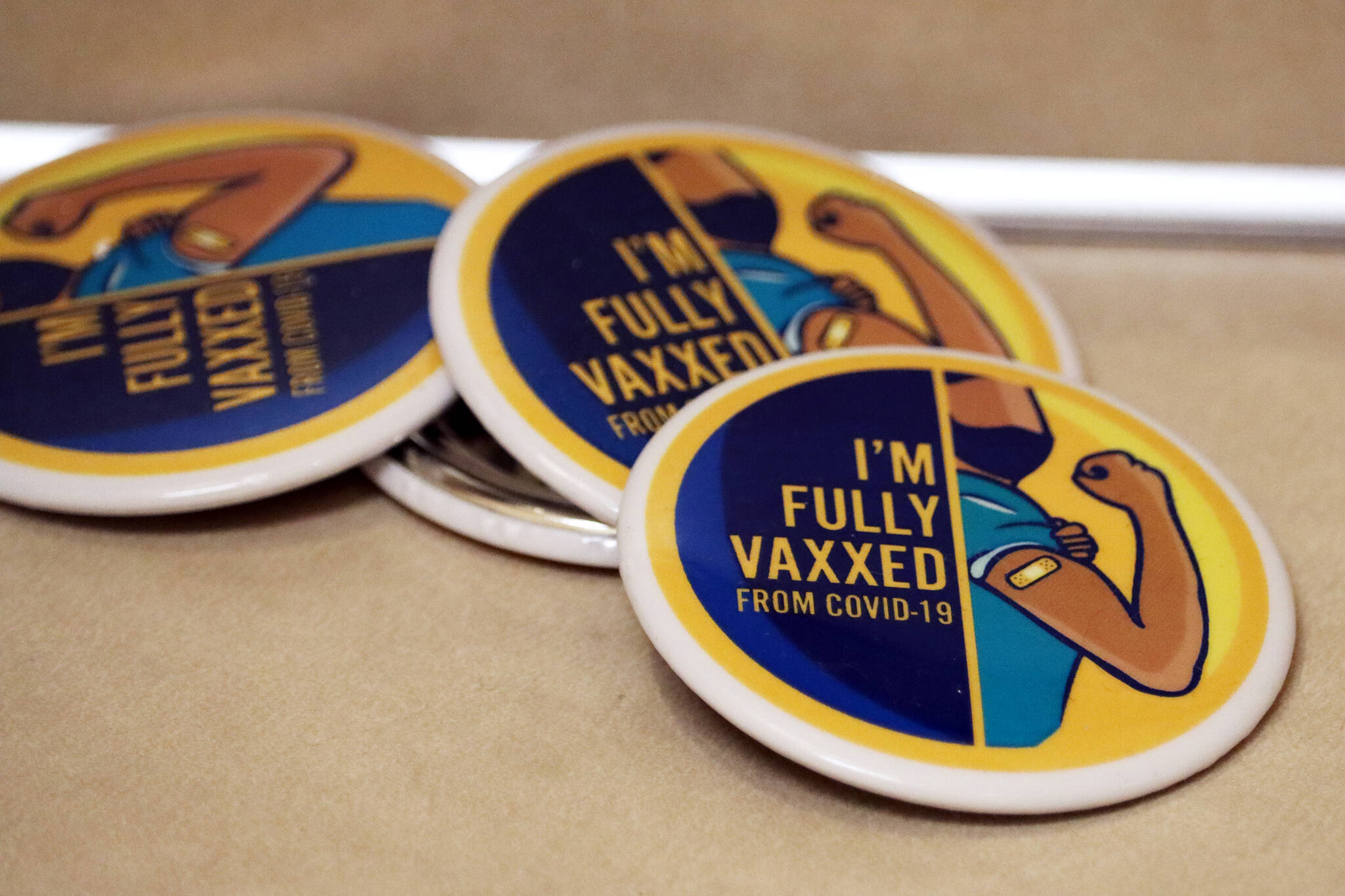City and Borough of Juneau Assembly members agreed at Monday night’s Committee of the Whole meeting to move a step closer to “modest relaxations” of the city’s COVID-19 mitigation strategies and heard from state experts who praised Juneau’s performance in keeping the worst of the pandemic at bay so far.
State public health officials said most of the areas of the state are trending in a downward trajectory of infections but noted that the emergence of the omicron variant–which so far has only been detected once in Alaska– could make the next few months bumpy and could stress hospital systems across the state.
Dr. Lisa Rabinowitz, an emergency medicine physician at Providence Alaska Medical Center and a staff physician for the Alaska Department of Health and Social Services, said that Juneau and Southeast Alaska continue to be “shining stars” with relatively high vaccination and booster rates, compared to the rest of the state. She said that’s an essential factor in keeping hospital capacity available as vaccinated people who get infected are much less likely to be hospitalized.
Juneau’s residents are also highly vaccinated compared to the rest of the nation. The Centers for Disease Control and Prevention said on Monday about 241.9 million people have received at least one dose of a Covid-19 vaccine, including about 204.1 million people who have been fully vaccinated by Johnson & Johnson’s single-dose vaccine or the two-dose series made by Pfizer-BioNTech and Moderna.
According to the New York Times, 61% of Americans are fully vaccinated as of Dec. 20 and 73% have received at least one dose.
In Juneau, 77.3% of the population age 5 and older has completed a series of two vaccines and 82.5% of the eligible population has received the first dose, according to CBJ’s COVID-19 dashboard.
[Snow fall challenges city removal crews]
Overall, state officials said they are watching for weekly trends instead of daily numbers because daily case counts tend to “have a lot of noise.”
State health officials also weighed in on the value of masking as a public health measure.
“Let’s all be honest, we’ve all been a whole lot less sick over the last few years. There’s tremendous value in universal masking when we are around others outside our homes. We have so much data to show that universal masking really cuts down on transmission,” said Dr. Coleman Cutchins, state pharmacist with DHSS.
Sarah Hargrave, southeast regional nurse manager with the DHSS division of public health, agreed.
“Masking has been very effective in Juneau,” Hargrave said.
Deputy City Manager Robert Barr told committee members that vaccinated people make up about half of Juneau’s current caseload.
“That sounds bad, but the context is that we know those cases are very unlikely to burden our medical system,” Barr told committee members.
Small, local changes
Currently, Juneau has an ordinance that covers COVID-19 mitigation measures. It includes a collection of strategies that vary based on the level of viral spread, local and regional hospital capacity, and public health’s ability to conduct contract tracing.
The overall mitigation measures will end on March 1, 2022, unless city leaders vote to renew them. Due to timing and public meeting requirements to amend an ordinance, debate on the measures is likely early in the new year.
On Monday, Barr told the committee that the changes he is suggesting now do not fundamentally alter the measures but refine them.
[City narrow field in search for new City Hall site]
He acknowledged that the mitigation levels continue to evolve and said he expects the evolution to continue.
“I fully expect we will be back to finesse these a little more,” Barr said. “We get accused of moving the goalposts, and we unashamedly do this because we learn more.”
Barr proposed three changes:
— Modifying the definition for the fully open level from the current requirement that 97% of the population be eligible for vaccination to “pending guidance from the federal Centers for Disease Control and DHSS.”
— Changing the wording around masking to a ‘recommendation’ at the moderate spread level.
— Revising the way gathering size limits are expressed to reflect a percentage of capacity rather than a hard number when the city is experiencing moderate or high rates of spread. Barr said this change would allow greater flexibility for specific venues.
In a memo to the committee before the meeting, Barr cited several factors for the proposed changes, including the communities high vaccination rate and booster dose availability. In the memo, he said the vaccines have shown the ability to moderate the worst outcomes against the variants and noted that comprehensive testing is widely available — including rapid antigen testing —and noted that therapeutics are also available.
Assembly members agreed to move the proposed changes to the full assembly for a vote early next year.
Searching for omicron
In a call with the Empire Tuesday morning, Dr. Joe McLaughlin, state epidemiologist and chief of the Alaska Section of Epidemiology at DHSS, confirmed that so far only one case of the omicron variant had been detected in Alaska.
But, he said it takes about two weeks to sequence samples.
“We totally expect a surge here, ” McLaughlin said. “We just don’t know when it will be.”
He said he urges “layered protection strategies,” including primary vaccination and booster shots as essential tools to prevent infection.
He said non-pharmaceutical interventions such as masking, social distancing and testing are essential tools.
“I encourage Alaskans to get tested before going to a Christmas for New Year’s Eve party,” he said.
In Juneau, people can register for COVID-19 testing online through https://juneau.org/covid-19 or by calling (907)586-6000.
• Contact reporter Dana Zigmund at dana.zigmund@juneauempire.com or 907-308-4891.

